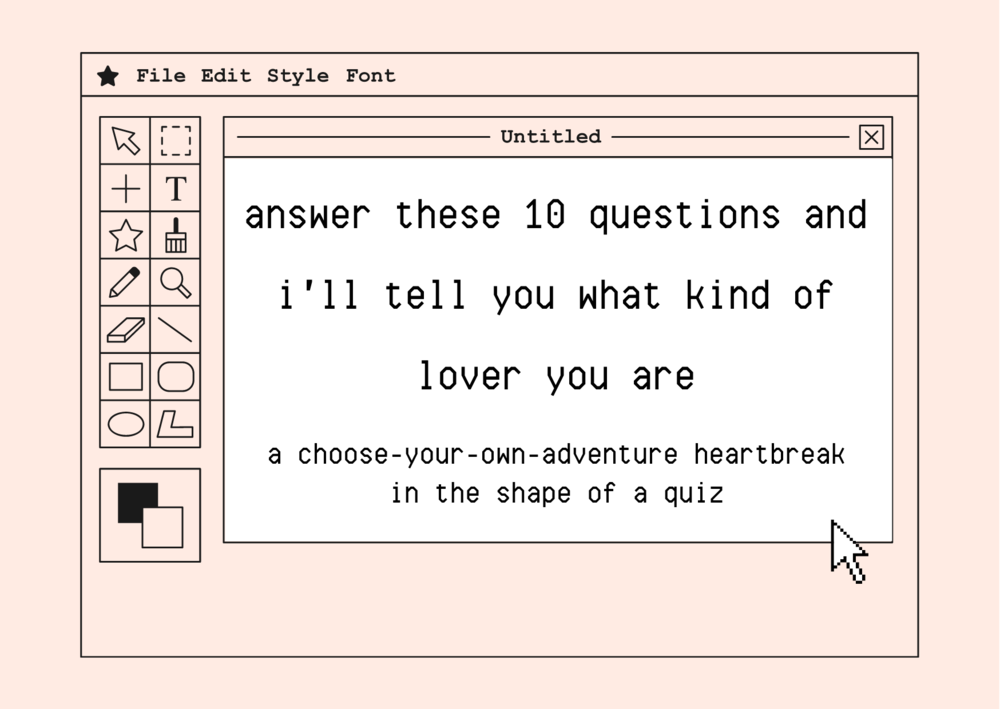INFORMED CONSENT: Most of these games discuss serious themes. They’re on a smaller scale than other posts with this warning1, but also warrant a heads-up. 10 questions is a melancholic and vulnerable conversation with an ex, but is worth playing unprompted before you read the rest of this. The last two have extended in-game content warnings that I suggest you read.
With the exception of Nanopesos, these games all offer catharsis and hope. I think their power comes from exploring their themes with empathy, but they might not be the right art at the right time for you and that’s okay too. Take care of yourself, whether that includes playing these or not.
answer these 10 questions and i'll tell you what kind of lover you are, Franny Mestritch
Nanopesos, Camila Gormaz (TW: poverty)
(★) Adventures with Anxiety, Nicky Case (TW: anxiety, alcohol)
Depression Quest, Zoe Quinn (TW: depression)
NOTE: As art, games are unique in letting us make choices and experience their consequences. This is hardly an original take. I kind of took this for granted while growing up with games as a default medium. Their choices and arbitrary limits are second nature to me.
Larger games make choices even more invisible23, abstracting them away behind beautiful graphics and immersive content that adapts to each player. I’ve dived through those worlds in their impossible detail. And I’ve loved it, but I have a soft spot for games that make choices obvious again.
You drop into the sewer. Something growls.
> go left
> go rightThese four games do this in different ways, with 10 questions and Adventures with Anxiety being the simplest. Those two use choices to move us through fictional conversations. The consequences don’t change much, but the experience of choosing what to say is revealing. Nicky Case also uses this conversation format over a tense dinner table and late-night texts in their older Coming Out Simulator (TW: homophobia). It’s less charming and cathartic than Adventures with Anxiety but meant a lot to me when I played it. Adventures with Anxiety also pokes fun at the medium, relishing in goofy minigames about taming your worst thoughts.
Nanopesos and Depression Quest go further. They don’t just use choices, they’re games about choices, and often choices that you can’t make. Nanopesos has you struggling to make ends meet, grounded in Chile’s economic inequality4. It’s understated and repetitive. Your ever-declining account shows up on almost every screen, before and after every choice. I love how tomorrow is bolded the same way your spending choices are — you don’t have a choice in facing the next day’s sacrifices, but it’ll force you to click through like you do. It’s rightfully bleak.
Finally, I cannot recommend Depression Quest more highly. It’s about the obvious choices depression takes away from you. Where Nanopesos is economic, Depression Quest explores relationships and socializing with depression. It would be a disservice to prime you with more than that and the carefully-crafted content warning the author5 provides, so I’ll leave it to them. Noah Caldwell Gervais' review of Depression Quest is as detailed and nuanced as the game deserves, although if you’re willing to sit through it, it’s longer than a typical playthrough and great as a follow-up.
But yeah. I love how intimate these experiences were. I love how loaded the options feel — even if the fate of a fantastical world isn’t at stake, I know what talking to an ex feels like. I’ve felt the weight of vicious budgeting and grappling with mental illness. None of them have definite wins or losses, the conversation just continues and the simulated life can get slightly better or worse in intimate ways that sit with you after you close the browser. They give up on perfectly replicating the experience, you won’t find a therapist rendered in high-resolution raytraced polygons. The language of games is enough.
So I love that these games exist. You’ll find countless more like them on the independent platform itch.io. shinies is a series about the esoteric, small wonders of online indie art, and these games capture the spirit perfectly. I hope you find one you enjoy!
>v001
That would be THE BIG QUIET and appetizers - v005. I’m spacing these out, because I don’t want to imply that I mostly consume sad, painful stuff. As the quote goes (filtered up to me through Reddit screenshots of Tumblr):
“The trouble is that we have a bad habit, encouraged by pedants and sophisticates, of considering happiness as something rather stupid. Only pain is intellectual, only evil interesting. This is the treason of the artist; a refusal to admit the banality of evil and the terrible boredom of pain.”
—Ursula K. LeGuin
And yeah, most painful experiences for me are filled with that terrible boredom. So I try my best to highlight empathy and catharsis whenever I share art about it.
I’m ripping the idea of invisible choices from this Game Maker’s Toolkit video. GMTK is one of my favorite creators and a massive influence on my education-through-cool-media approach.
Designers control how much choices matter to a narrative in some cool ways (see this blog for some cool diagrams on choice design)! 10 questions is a “gauntlet”, Nanopesos is a “loop-and-grow”, Adventures with Anxiety is a “branch-and-bottleneck”, and Depression Quest is too big for me to classify easily.
SPENT is a similar game about budgeting in poverty. It has a lot more detail, more complicated gamesystems to make choices in, but plays like an infographic. I prefer the narrative experience in Nanopesos, since human stories stick with me longer than statistics.
Both are worth playing though. The terrible feeling of survival that they bring up is one that privileged voters in any developed economy should reckon with. They show our mundane political choices of letting poverty persist and the invisible social consequences others are stuck with experiencing.
Internet-savvy readers might remember how Depression Quest was also at center of the online anti-feminist harassment campaign known as GamerGate. I don’t have it in me to describe the campaign’s toxic effect on gaming culture, much less on the women journalists, developers, and fans it targeted.
I hate how familiar the alt-right outrage it manufactured is to me, a queer person online watching other queer people online. I’ve had personal experiences with the bigotry it emboldened. The digital extremism it pioneered remains politically relevant. Its looming influence is part of what I referred to in the lancer!l★ncer! introduction:
“Yet above all else I will try to be passionate. I would like the world to have more passion, that sweet antidote to moral purity and fear, especially for the things I’ll write about. Passion for people like me is political.”


